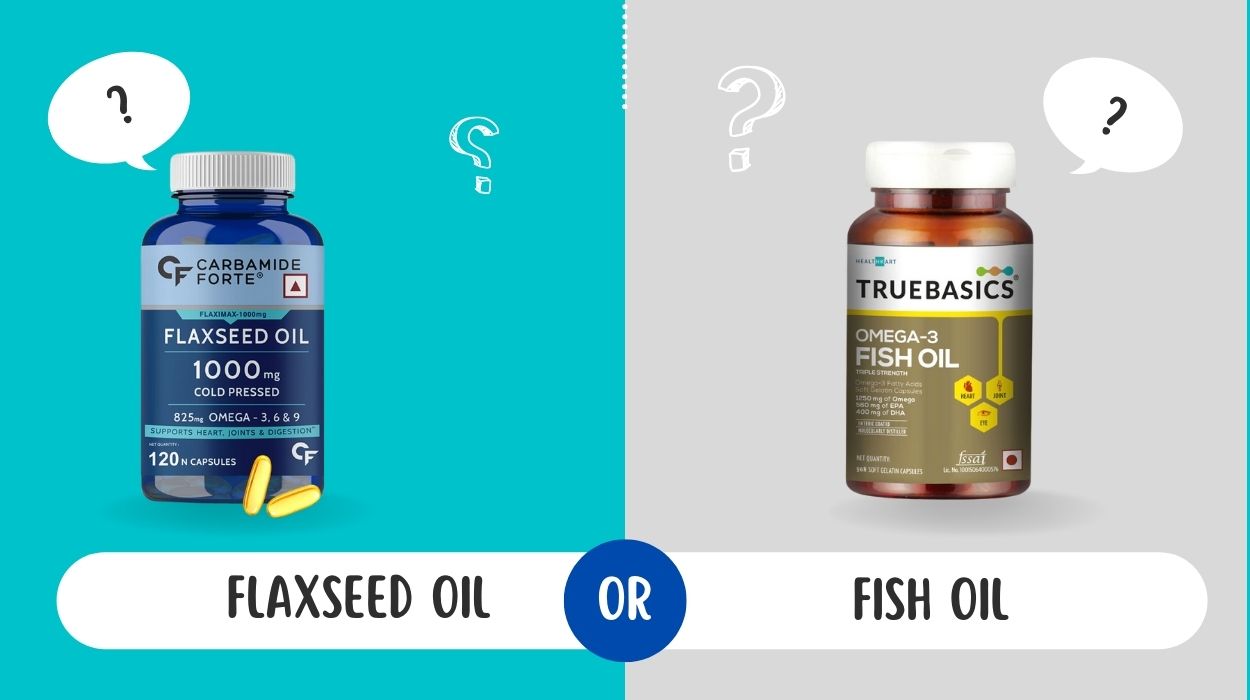The oils made from flax seeds and fish are famous for their omega-3 fatty acids and various health benefits. In today’s world, where we have so many options and resources to choose from, one might get easily confused about what the better choice is. I experienced this when I had to choose between flaxseed and fish oil.
Though both oils have many benefits, they serve different purposes. Flaxseed oil contains ALA while fish oil contains EPA and DHA. I personally felt that fish oil suited my needs better.
To learn all about flaxseed oil and fish oil and what the better option is, scroll down and start reading!
Flaxseed and fish oil: what are they?
Flaxseed and fish oil, popular for their beneficial properties, contain omega-3 fatty acids. They help in reducing the risk of heart diseases and high blood pressure. Though they have many benefits like improving brain health, reducing joint pains, chances of cardiac problems, etc., they also have unique properties that set them apart.
What is flaxseed oil?
Flaxseed oil comes from the seeds of the flax plant, which is used to make fabric for clothes and textile products. These seeds are incredibly nutritious, and the oil is made by cold-pressing ripe, and dry flax seeds.
There is omega-3 fatty acid ALA in flaxseed oil. The recommended amount of ALA is 1.1g for adult women and 1.6g for adult men. 7.3g of ALA is present in one tablespoon of flaxseed oil. However, for ALA to be utilized appropriately, we should convert it to EPA and DHA.
What is fish oil?
Fish oil is extracted from fish tissue and consumed as dietary supplements, and these supplements are made with oil extracted from fatty fishes like mackerel, tuna, etc. The fatty acids present in it contribute to keeping the heart healthy. EPA and DHA are the primary acids present in fish oil. Though it varies according to the brand and supplement, a typical fish supplement will contain 180mg of EPA and 120mg of DHA.
The common benefits provided by fish oil and flaxseed oil
Rich in omega-3 fatty acids, they both provide some common benefits. One of the vital benefits of these oils is their ability to better the heart’s health. Taking supplements with these oils has proven to lower blood pressure levels in adults and reduce the risk of heart diseases.
Consuming fish oil supplements have decreased triglycerides in people. Fish oil improves HDL, which is good cholesterol, and lowers blood triglycerides by 30%. The cholesterol levels can also be controlled by taking flaxseed supplements. These supplements reduce LDL, which is bad cholesterol, and boost productive cholesterol.
Fish oil supplements can help treat skin conditions like dermatitis, psoriasis, and skin damage due to UV radiation. The fatty acids in the oils are suitable for the skin. A study conducted in which women consumed flaxseed oil for 12 weeks showed that it helped in improving the skin’s sensitivity and made the skin hydrated and smooth.
Another good use of flaxseed and fish oils is to treat inflammation. Chronic inflammation increases the risk of conditions like diabetes, and fish oil helps reduce this risk with anti-inflammatory properties. It also helps treat inflammatory bowel disease, rheumatoid arthritis, lupus, etc.
Individual benefits of flaxseed and fish oil
Besides the benefits mentioned above, fish oil and flaxseed oil have other properties that make them suitable for improving one’s health. They both have individual benefits that serve different purposes.
Benefits of Flaxseed oil
Flaxseed oil is used to treat gastrointestinal symptoms, constipation, and diarrhea. It can act as a laxative and improves bowel regularity. It reduces the risk of diarrhea and improves stool consistency in people with renal disease.
There is also research that shows that flaxseed oil may reduce the growth of cancerous cells. Consuming flaxseed oil can improve the elasticity of arteries, thus improving the heart’s health. It can also be used to treat inflammation.
Benefits of Fish oil
Fish oil has proven helpful in treating mental health disorders like depression, bipolar disorder, schizophrenia, etc. Fish oil can also treat behavioral disorders in children as it helps treat hyperactivity, attentiveness, and aggression. It could also help in improving one’s eyesight and keep the eyes healthy.
Consumption of fish oil may improve asthmatic symptoms and prevent allergies. It reduces the fat in the liver and keeps it healthy. Fish oil possesses anti-inflammatory properties and also helps in keeping one’s skin healthy and hydrated.
Which is the right option for you: fish oil or flaxseed oil?
We can see that both flaxseed and fish oils have their benefits. However, looking at shared benefits, one can say that fish oil might have the upper hand. Fish oil has EPA and DHA, while flaxseed oil contains ALA. Though ALA is essential, EPA and DHA have more health benefits. Moreover, creating EPA and DHA from ALA is not efficient in humans.
The amount of ALA converted into DHA and EPA is very little. Due to this, the better option is to take fish oil supplements rich in EPA and DHA and provide more benefits. In addition to this, there is more research to back fish oil’s anti-inflammatory properties and the ability to reduce heart diseases. Omega-3 fatty acids in fish oil boost mental health and cognitive skills. The EPA in fish oil relieves stress and relaxes the nerves.
In conclusion, fish oil will provide more clinical benefits when compared to flaxseed oil, and it is recommended for consumption. However, flaxseed oil is an appropriate choice for people allergic to fish.
Conclusion
Fish oil has many benefits, including keeping the heart healthy, improving the skin’s health, and treating mental disorders. Flaxseed oil is commonly used to lower blood pressure, reduce the risk of heart conditions, treat gastrointestinal problems, etc. Fish oil has EPA and DHA, while flaxseed oil contains ALA.
While ALA is highly essential, EPA and DHA provide more benefits. In conclusion, fish oil is the better alternative as it has EPA and DHA and keeps the skin, heart, and mental state healthy. If the person is a vegetarian/vegan or is allergic to fish, they can consume flaxseed oil supplements as it is an appropriate choice.
We hope you learned all you needed to know about fish oil and flaxseed oil to make the right choice. Leave your thoughts and experiences down below, and thanks for reading!




